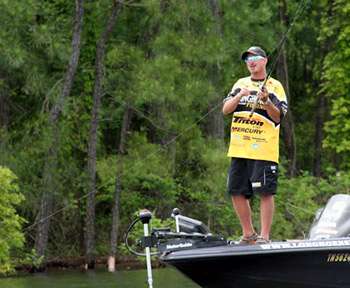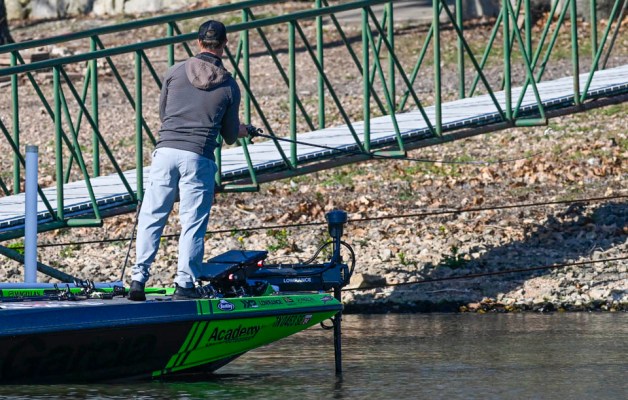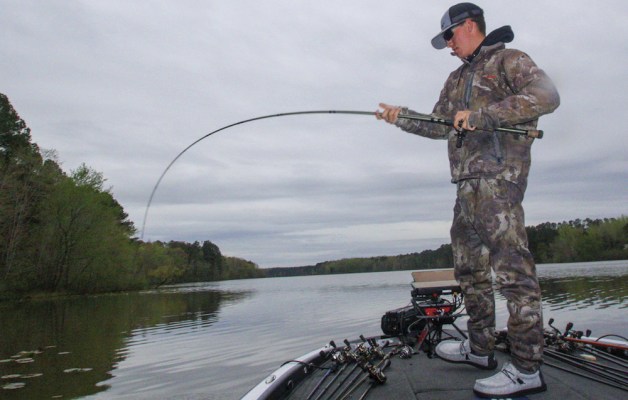
If a basketball player misses a buzzer-beater or a wide receiver drops a 4th-and-20 pass in the final seconds of regulation, the game is over. In bass fishing, though, the game continues even after a key opportunity is gone. How an angler deals with the agony of a lost fish could spell the difference between a great day on the water and a day spent lamenting what could have been.
Here's how three Bassmaster Elite Series anglers deal with losing bass. Oklahoma pro Jeff Kriet knows how lost fish can play on the psyche. During the Florida Swing, which opened the 2008 Elite Series season, lost fish had a tremendous impact on his tournament performance. "I started off the season at Harris Chain and lost the first four bass that bit.
All of these were 3- to 4-pound bass, and I let it affect my whole tournament," says Kriet. "I was obviously around big bass, but I let the fact that I lost those fish really bother me. In fact, I was so mad that I carried it over to the next tournament on Toho and finished 90th." Returning home from Florida, Kriet read a sports psychology book to help him control the mental aspect of his game. "What was happening was I would hook a bass and immediately start thinking, 'Stay on, stay on.' Right off the bat, it was negative vibes.
In fact, I was getting a bite and thinking about losing the fish even before I set the hook." After reading the book, Kriet began to approach the rest of his 2008 season with a new attitude. "I looked at all the mistakes that I had made and I don't think I'll ever make them again. You hate to lose a big one, but everyone does it. If you let it eat you up, it destroys you," explains Kriet. "
The really good guys out here on Tour, the guys who are fishing at a different level, will lose a fish and immediately shake it off mentally. What I tell myself now is, 'Well, obviously there's one good one here, so there's probably going to be others along with it.'" Fellow Oklahoma pro Fred Roumbanis shares Kriet's struggle with keeping a positive attitude after losing a big bass. "It's frustrating," admits Roumbanis.
"It usually takes me at least 15 minutes to settle down again." To relieve the stress from losing a bass, Roumbanis tries to think of the situation in a different light — rather than focus on the lost opportunity, he considers it a positive sign of things to come. "I try to think of it as if I was just out pre-fishing and shook one off. I look at it as an indication that the opportunity to catch big fish is still present."
During the past two years on the Elite Series, Roumbanis has racked up two wins, posting victories at the 2007 Bassmaster American on High Rock Lake and Carolina Clash this past May on Lake Murray. In both tournaments, Roumbanis was unable to fish flawlessly, yet he quickly rebounded. "In the tournaments I've won, I lost fish," says Roumbanis. "In a way, losing fish is more important than not getting bit because it gives you confidence that there are still big bass around.
You may not get that big bite again, but at least you'll stay in the right area." Veteran Florida pro Shaw Grigsby fished his first Bassmaster Invitational in 1977. Over the past 31 years of fishing professionally, Grigsby has lost hundreds of big bass.
For him, it's just part of the game. "It's not going to happen all the time, but you're going to lose some fish. I've been a professional a long time and I can still remember tournaments from years ago that I lost because a bass came off at the boat." Grigsby takes several steps immediately after losing a fish to analyze why it came off. "I take every lost fish and turn it into a learning experience.
Did I make a mistake like rushing the fish or trying to boat flip it before it was tired? Whatever the situation was, I take that and learn from it. The next thing I do is immediately get it out of my mind," says Grigsby. Another step is to identify how the fish bit. This is key to increasing the bite-to-boat ratio for the remainder of the day. Grigsby explains, "Every day the bass bite differently.
On some days, they will be really aggressive and choke on the bait. On other days, the bite will be tentative. The sooner you can key in on how the bass are biting, the more you are going to land." During the seventh stop on the 2008 Elite Series on Wheeler Lake, a lost bass on the opening morning taught Grigsby a valuable lesson which he used to earn a Top 12 finish. "I hooked a 5-pounder and immediately got the fish up to the boat, but it headed back down. Instead of burying the rod in the water to keep the fish deep, I immediately tried to land it. When I raised my rod, the fish came up and threw the bait. "I learned from that experience. The next day I was in the same situation.
I saw that the fish was barely hooked, so when the fish dove under the boat, I immediately buried my rod in the water and I just let it go down until he was really tired. All I had to do after that was just reach down and get it." While losing a giant is never a good feeling, turning the tables and landing a fish that is barely hooked can turn a mediocre day into a great day.
"Landing a fish that you should never have gotten to the boat can totally change your day," notes Kriet. "When you have a big fish that just has one little hook in it and you land it, your confidence goes sky high and you carry that through the day." Grigsby agrees, pointing to a tournament when luck was on his side. "I had a 5-pounder that was barely hooked, and when I brought it beside the boat it went ballistic. It blasted out of the water and was bouncing off the side of the boat.
I finally pinned it against the side of the boat and landed it just as the hook fell out," Grigsby says with a laugh. "I just sat back and said, 'Wow. That was a really big break.' Landing that fish gave me a lot of momentum and allowed me to treat the second and third fish that I hooked much more gently."
(Provided by Z3 Media)




